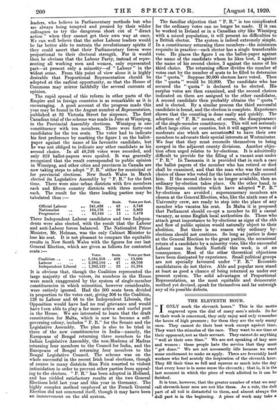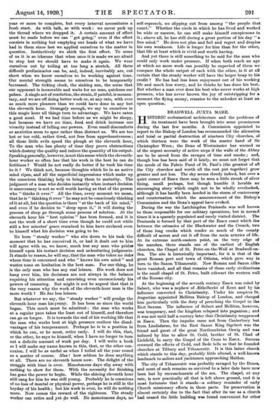THE ELEVENTH HOUR. " I. r ONLY mark the eleventh
hours." This is the motto
engraved upon the dial of many men's minds. So far as their work is concerned, they only enjoy and only remember the hours of high pressure ; for them they are the only sunny ones. They cannot do their best work except against time. They want the stimulus of the race. They want to see time as their opponent, not as their servant. They cannot do anything " well at their own time." We are not speaking of lazy men and women : these people hate the service that they must " get done." We are not necessarily idle because we want some excitement to make us apply. There are feverishly hard workers who feel acutely the inspiration of the eleventh hour. They fill their time so full and squeeze so much into the day that every hour is in some sense the eleventh ; that is, it is the last moment in which the piece of work allotted to it can be finished.
It is true, however, that the greater number of what we may call eleventh-hour men are not like these. As a rule, the dull part of all toil is distasteful to them, and almost always the dull part is in the beginning. A piece of work may take a year or more to complete, but every interval necessitates a fresh start. As with talk, so with work : we never pick up the thread where we dropped it. A certain amount of effort must be made before we can " get going," even if the effort consists in nothing but emptying our heads of what we have had in them since last we applied ourselves to the matter in question. Instinctively we shirk the first effort. To some of us it is so irksome that when once it is made we are afraid to stop lest we should have to make it again. We wear ourselves out by toiling at too long a stretch. All these difficult preliminaries can be, and, indeed, inevitably are, cut short when we know ourselves to be working against time. Our mental strength seems to ourselves to be temporarily increased. The ticking clock, the sinking sun, the sense that our opponent is inexorable and waits for no man, quickens our pulses. A single act of resolution, the strain, if painful, is momen- tary, and we are off doing better work or, at any rate, with ever so much more pleasure than we could have done in any but the eleventh hour. Strangely enough, we say to ourselves in this magic hour all things turn to advantage. We have eaten a good meal. If we had time before ua we might be sleepy, but because we have no time; food and drink increase our vivacity instead of lulling our powers. Even small discomforts or anxieties seem to spur rather than distract us. We are too hot or too cold, rather tired, not free from apprehensiveness ; all these little evils speed the plough at the eleventh hour. To the man who has plenty of time they prove obstructions which destroy the quality and reduce the quantity of his output. Speaking generally, however, is not this sense which the eleventh,. hour worker so often has that his work is the best he can do fictitious ? Would he not really do better if he took his time to it ? We think not, because thoughts which lie in an active mind ripen, and all the superficial impressions which make up the conscious thinkin3 help to bring them to maturity. The judgment of a man who decides instantly when instant decision is unnecessary is not so well worth having as that of the person who " thinks it over." All the time, every moment we mean, that he is " thinking it over " he may not be consciously thinking of it at all, but the question is there " at the back of his mind," and even if he decides to " sleep upon it," it will during the process of sleep go through some process of solution. At the eleventh hour his " best opinion " has been formed, and it is not the work of a short time even though he could not while still a few minutes' grace remained to him have declared even to himself what his decision was going to be.
No born "steady worker" who sits down to his task the moment that he has conceived it, or had it dealt out to him will agree with us, we know, much less any man who prides himself upon his instant decision and unhesitating judgments. It stands to reason, he will say, that the man who takes no risks where time is concerned and who " knows his own mind " and wastes none on hesitation is the best man. For one thing, he is the only man who has any real leisure. His work does not hang over him, his decisions are not always in the balance requiring his attention and exercising even unconsciously his powers of reasoning. But might it not be argued that that is the very reason why the work of the eleventh-hour man is the more worth ? He has less leisure.
But whatever we say, the " steady worker " will grudge the eleventh-hour man his penny. It has been so since the world began. This much must be admitted : the man who works at a regular pace takes the least out of himself, and therefore can go on longer. It is towards the end of his working life that the man who works best at high pressure realizes the disad- vantages of his temperament. Perhaps he is in a position in which he can, or he must, retire early. I will do this, that, or the other, he says to himself, when I have no longer to turn out a definite amount of work per day. I will write a book or I will make my name known in this, that, or the other con- nexion. I will be as useful as when I toiled all the year round as a matter of course. Alas ! how seldom he does anything at all. There are no eleventh hours now. The delight of the struggle with time is over. Monotonous days slip away with nothing to show for them. With the necessity for finishing has gone the power to begin. While the shining eleventh hour still rang for him he was still young. Probably he is conscious of no loss of mental or physical power, perhaps he is still in the heyday of his health ; but his work is over, he will do nothing more. Now comes the reward of the righteous. The steady worker can retire and yet do well. No monotonous days, no
self-reproach, no slipping out from among " the people that count." Whether the circle in which he has lived and worked be wide or narrow, he can still make himself conspicuous in it ; above all, he has still during a great portion of his day "a free mind." He does not plan and fail and regret and despise his own weakness. Life is longer for him than for the other, that life at least which is vivid and worth having.
And yet there is still something to be said for the man who could only work under pressure. If when both reach an age at which no more work can possibly be expected of them we compare the whole output of each with the other, is it at all certain that the steady worker will have the larger heap to his credit ? He has had less keen enjoyment out of his working life and much less worry, and he thinks he has done his best. But whether a man ever does his best who never works at high pressure, who has never known the joy of outstripping for moment the flying enemy, remains to the onlooker at least an open question.



































 Previous page
Previous page